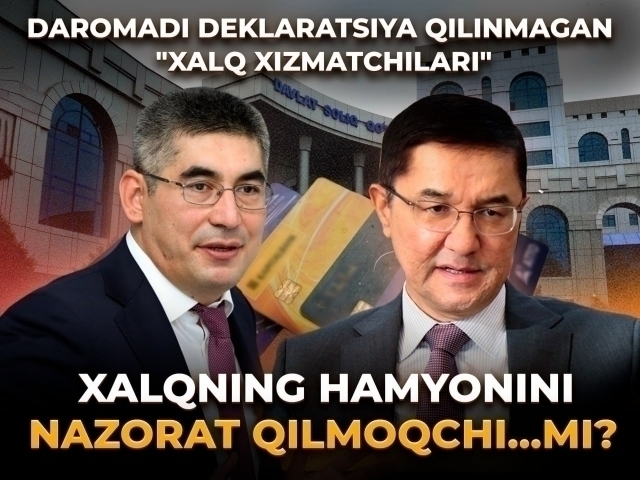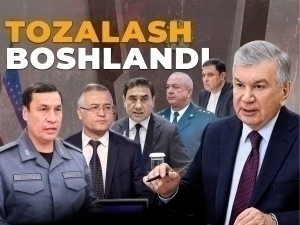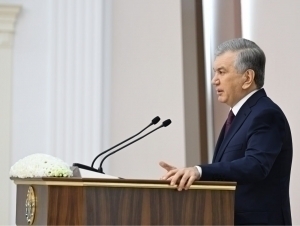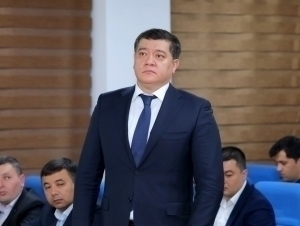Do “public servants” whose income is not declared want to control the people's purse...?
Local
−
02 May 2024 17476 7 minutes
The government is preparing a draft "secret" document to combat the underground economy. The text of the decision has not yet been made public, but the public has been informed about the new norms. The new procedures reflected in the draft of the presidential decree "On the adoption of a decision on the implementation of comprehensive measures to combat the underground economy" have been subject to scrutiny and objection in a short period. So, what kind of anti-human initiatives did they take?
Proposals made in the draft decision:
- Cancellation of cashback for payments made in cash from July 1, 2024;
- Authorization for tax authorities to enter the taxpayer's territory and inspect buildings;
- If card-to-card transfers (P2P) exceed the limit of 100 million soums per year for individuals and 500 million soums per year for entrepreneurs, the Central Bank and the Tax Committee shall mutually inform each other of these transactions;
- Calculation based on minimum amounts per square meter when determining the tax base for real estate objects sold to individuals by construction enterprises;
- Sale of housing, real estate, and motor vehicles only through cashless settlements;
- Payments above $3,000 for goods and services are suggested to be made only in cashless form.
How fair is the draft document?
The main aspect of the draft resolution causing public concern is that the Tax Committee may have access to the financial information of bank card holders, contrary to the Constitution of Uzbekistan and the law on "Bank Secrecy". The tax committee has attempted several times before to monitor card-to-card transfers. In 2020, the committee proposed a draft decision requiring banks to notify tax authorities if more than 30 million soums are deposited on all cards of individuals and the number of card-to-card transactions exceeds 10. The project was not accepted due to numerous objections. The Chamber of Commerce and Industry, the Senate, Uzcard, and the Central Bank condemned the Tax Committee's actions in this regard.
Both the Ministry of Economy and Finance and the Tax Committee, which intend to fight against the underground economy, seem to be fighting against those engaged in the underground economy rather than addressing the factors that force entrepreneurs and citizens into the underground economy. It is alleged that the committee is attempting to establish control over individuals and small and medium-sized business entrepreneurs.
Economist Otabek Bakirov described the new project as "a bad project with the devil hiding in its details."
"This is a bad project, even if it includes several constructive steps, because among it, knowingly or unknowingly, deliberately or blindly, it does not help fight the underground economy; instead, it sets up 'mines' for small businesses," Bakirov wrote on his Telegram channel.
The author of the "Davletovuz" Telegram channel expressed the following opinion:
"The measures to combat the shadow economy developed by the government (so far in the form of a draft), along with positive proposals, arguably increase the risk of providing the Tax Committee with absolute and uncontrolled powers. At worst, this office may be trying to acquire additional powers and instruments. Tomorrow will be too late; we must think today.
One thing should not be forgotten: the current budget deficit is not caused by ordinary people or small and medium-sized entrepreneurs, but by the government's wasteful spending, monopolies, and subsidies received by big businesses. Therefore, it is unjust to try to reach into the pockets of ordinary people when the government itself is part of the problem.
What does the tax committee say?
After critical articles in the media and objections expressed on social networks, on May 1, the Tax Committee commented on the situation related to the draft decision:
"The Tax Committee respects the opinions and views of every taxpayer! ... Before the draft decision 'On the implementation of comprehensive measures to combat the underground economy' is introduced to the Government, by the procedure established by the current legislation, public opinion will be studied, and suggestions will be received through the portal regulation.gov.uz for wide public discussion.
Based on public discussions (advice and recommendations of entrepreneurs, civil society institutions, scientists, experts, and specialists), the project will be completely revised, and after eliminating the procedures and requirements that negatively affect business activity, the project will be submitted to the Government. We assure you that we will consider the recommendations," the committee said.
However, some do not believe in such words aimed at calming the public. For example, Bakirov wrote on his page on X:
"Those who think that the tax authorities have temporarily retreated from their goals are seriously mistaken. The budget is empty, the bottom of the reserves is visible, and the debts will not repay themselves. Oligarchs, those from the north, monopolists, and tax collectors, who are robbing Uzbekistan, unfortunately, will not stop. That is why they will return with an army. Invertebrates, if necessary."
In fact, in 2020, the committee that was denied access to bank card information is trying to regain this authority. Is the purpose of this to fight the shadow economy, as tax collectors claim? Tax officials believe that the limit set on card-to-card transfers will have the opposite effect, increasing the number of cash payments, and business owners will try even harder to conceal their activities. Did it? In general, why do entrepreneurs avoid paying taxes? What compels them to conduct their activities secretly when they have the opportunity to operate under the protection of the state by paying taxes? Isn't the government's first task to find answers to the above questions?
"A crow does not pick a crow's eye"
In four years, the government has managed to develop several draft documents aimed at acquiring bank card data of ordinary citizens and clandestine entrepreneurs. However, since 2021, they have not been able to approve the ready law on the declaration of property of civil servants. If you recall, with the Decree of the President, from January 1, 2022, it was decided to introduce a system of compulsory declaration of property for civil servants, heads and deputies of organizations, state enterprises, and institutions with a state share of more than 50 percent, as well as their spouses and minor children. They said that not only he but also his relatives will not get rich.
However, there is still no sign of this law. The draft Law "On declaration of income and assets of civil servants" was developed by the Anti-Corruption Agency and was supposed to be submitted to the Cabinet of Ministers, according to information provided to QALAMPIR.UZ by the anti-corruption agency, in August-September 2021, the draft law was to be submitted for consideration to several government bodies, including the General Prosecutor's Office of the Republic of Uzbekistan, the Ministry of Internal Affairs, the Ministry of Justice, the Supreme Court, the State Service Development Agency, the Ministry of Employment and Labor, and the Ministry of Economy and Finance. Initial and departmental agreements were made with the Central Bank and improved based on their suggestions. The draft law was submitted to the Administration of the President of the Republic of Uzbekistan on November 1, 2021, and to the Cabinet of Ministers of the Republic of Uzbekistan on November 13. However, there is no sign of this law.
If actions against the secret economy, corruption, theft, and inquiries are conducted, why shouldn't the government set an example and initiate them itself? Do the "public servants" whose property and income are not disclosed, and whose declarations have not been made for several decades, have the right to oversee the money flowing into the people's pockets?
Live
All




